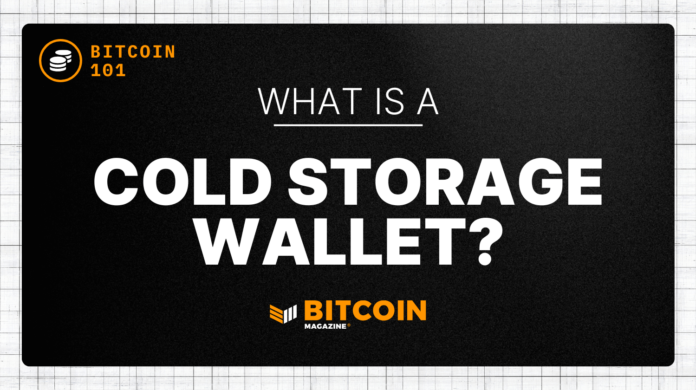A cold wallet is a device collecting bitcoin addresses and keys that unlock funds in an offline mode. Since cold wallets don’t require an internet connection, they prevent unauthorized access, cyber hacks or other vulnerabilities typical of online attacks.
You can protect your private keys in different ways, depending on whether the key storage platform comes into contact with the internet or other connected devices. Keeping your private keys offline is one of the best ways to protect them.
Cold wallets, or cold storage methods, contrast with hot wallets that are typically connected to the internet. Cold storage was purposely developed for the individual’s cryptocurrency storage. Still, enterprises, exchanges and general-purpose digital currency platforms use it because its offline setup provides higher security than hot storage, keeping hackers at bay.
Why Do You Need a Cold Wallet?
When you hold a significant amount of bitcoin, your first concern should be to secure it. Unlike a bank or savings account that will refund any amount proven to have been stolen from a client, Bitcoin has no central authority that can guarantee its safety in case something goes wrong.
Therefore, it cannot be recovered if lost or stolen through fraud. For this reason, soon after Bitcoin was created and later acquired considerable value, it became necessary to develop a system better capable of protecting it from online attacks that are more likely to occur in hot wallets.
Although online security has improved over the years and enhanced measures have been designed to prevent theft, hackers have become increasingly skilled in attacking business and personal accounts, especially when money is involved.
It’s worth remembering that a digital wallet does not contain the bitcoin stored on the blockchain. Instead, it includes the private and public keys that give access to the coins, and the offline cold wallet allows you to safely store, protect and use them to unlock the funds held on the blockchain.
Besides storing bitcoin in a cold wallet, hodlers should consider using multisig solutions for better security than single-signature services. A 2-of-3 multisig wallet, for instance, makes it nearly impossible for a hacker to steal enough private keys to access the funds. Multisig also provides better security if hodlers forget or lose access to one private key; in that case, they can use the other two to recover the funds.
Hot vs. cold wallets
Hot wallets can be simple apps downloaded on mobile devices, browser apps or software provided by cryptocurrency exchanges. In contrast to cold wallets, hot wallets are usually free, more straightforward and convenient to use since all you need is an internet connection to execute the transaction.
Despite the improved security in hot wallets over recent years — thanks to cryptographic protection measures — they cannot match the security of hardware or cold wallets. For this reason, they are primarily used to execute small transactions faster and more efficiently.
On the other hand, a hardware device requires a few more steps as it must be connected to online software through a USB drive or Bluetooth, operated in tandem to execute transactions and confirm them on the device, making the process longer and more burdensome. This is why cold storage solutions are the preferred option for securing all or most of your bitcoin.
How Does Cold Storage Work?
Cold storage means that the private keys have never been on a networked computer or device and have been generated offline without intermediaries. Signing outgoing transactions with those keys also takes place offline. This method is more common for the long-term storage of large funds.
Once you get hold of a cold wallet, be it hardware, paper or sound device, you must first secure your backup — recovery or seed phrases — which you will need in case you lose access to your device for any reason. A seed phrase is a list of words that regenerate your private key. You can use your seed phrase to move your keys to a different hardware wallet, which is convenient in case you lose the physical device.
The extra layer of security that comes with a cold storage device makes the transaction process longer and more burdensome than for transactions with hot wallets. However, unless you’re using a wallet for everyday transactions to buy goods or services, it is worth spending some extra time and effort to secure your funds.
Types of cold storage wallets
Paper Wallets
Paper wallets used to be the primary cold storage solution among Bitcoiners until they were replaced by hardware wallets, which are more practical and safe.
A paper wallet is a physical piece of paper or an object. It contains the public and private keys and the QR code to make transactions. They are recognized as cold storage because you do not need an internet connection to use them; it’s instead recommended to work offline when generating the key and QR code data to print out.
Paper wallets remain a good option for storing bitcoin, though hardware wallets are worthy replacements.
Sound Wallets
Sound wallets are seldom used but can be alternative cold storage for the more extravagant Bitcoiner with extra cash to spend.
Sound wallets require users to record their private BIP38 encrypted key and transform it into a sound file to store onto a compact disk (CD) or a vinyl disk (a record) in an encrypted manner. This way, if the disk gets stolen and the file is listened to by another person, all they hear when they play it is static noise — a frequency of electromagnetic or thermal sound.
Burning a DVD or a CD is still relatively easy and affordable. At the same time, recording vinyl is much more challenging and expensive since it requires the use of specialized hardware like a turntable, record lathe and blanks.
Sound wallet users can decrypt the private key using a spectroscope application or a high-resolution spectroscope, an instrument that produces spectra from or by using electromagnetic waves.
Hardware Wallets

(Caption: Bitbox02 hardware wallet)
Hardware wallets are the most popular type of cold storage because they are relatively affordable tools. They provide extra security and fault tolerance because they are not connected anywhere and cannot be hacked like a computer. They use an offline device or smart card to generate the private keys stored within the device without ever leaving it.
Transactions are signed using a PIN-protected external device that does not need to be imported to software like paper wallets. Backups are secured using a 12- or 24-word mnemonic phrase. You must buy the hardware wallet from the original stores to avoid a compromised shipment. Never acquire a second-hand hardware wallet, which can lead to lost funds.
Air-gapped wallets offer extra security as they never get exposed to an online connection, not through Bluetooth, WiFi or USB ports, and are designed to be completely isolated from other electronic tools. Even if a hacker has managed to access your system and install malware, your funds are still safe because there is no gateway for the malware to broadcast the information it might have previously stolen.
Deep Cold Storage
Consider deep cold storage for funds you do not want or need to access for a long time, as this type of solution is inconvenient, requiring time and effort to access and retrieve your keys.
It could involve anything from safely securing your cold wallet device in a box and burying it deep underground to hiring a third-party solution that stores your keys in a vault that requires multiple steps to access.
If you fear for your physical safety and have a considerable amount of bitcoin to store, you should definitely consider deep cold storage. It can be a creative alternative to burying the wallet underground, as long as you remember exactly what steps you took to secure it.
How Do Cold Wallets Prevent Theft?
The offline feature of cold wallets is critical to the security of the funds. With online or hot wallets, all transactions and components are exposed to the mercy of online attackers. Therefore, when you digitally sign transactions or store the private keys in hot wallets, these functions are broadcast online, meaning hackers can gain access to the private key information to steal your funds if they compromise your system.
In the case of cold wallets, transactions are signed with the private key offline, and they are therefore protected from online vulnerabilities, which drastically reduces the risk that your assets are stolen.
Such devices should only connect to your online account to broadcast a transaction when they’re physically plugged in through a USB drive, a compact disk (CD), a hard drive, paper or an offline computer. This way, your private key should never come into contact with an online server and be accessed by someone else.
Bitcoin is still residing on the blockchain, but the private key is hosted in the cold wallet, and it’s the only thing necessary to prove ownership and unlock your address on the blockchain. A PIN and an optional passphrase will give you access to the hardware wallet, where your private keys are stored and protected.
Taking security to the next level
Protecting bitcoin funds will probably become easier and more accessible to everyone in the future; however, it should not be viewed as a daunting experience, and most people should not seek complicated and burdensome solutions.
The long-term allocation of funds is recommended to be safely maintained in cold storage through any of the wallets suggested here. Multisig solutions will take cold storage security to the next level and provide peace of mind to the bitcoin owner by drastically reducing the risk of losing private keys.
The ultimate formula to secure your bitcoin is to combine cold storage with multisig solutions and creatively hide, bury or deposit the funds in deep cold storage.
Summary
Cold wallets are currently the most secure tools to store bitcoin, but they come with risks that every bitcoin owner should consider before picking a service.
While we have experienced huge developments over the years in protecting bitcoin funds from online attacks, there’s still a lot of room for improvements to make the existing solutions more affordable, accessible and ultimately more secure for every Bitcoiner.
It can never be stressed enough that malicious actors can exploit any system vulnerability or the individual’s negligence to steal funds online; therefore, securing your bitcoin should be the highest priority. Remember never to share your private keys online or with anyone. This way, you’re already on the right path to protecting your asset.
With plenty of proper education available online and in books, it becomes easier to know what works for you and your requirements. Bitcoin Magazine offers the right educational tools to guide you in understanding what’s available and how to acquire the right services.






